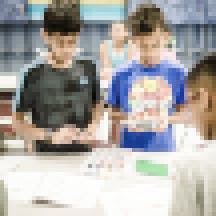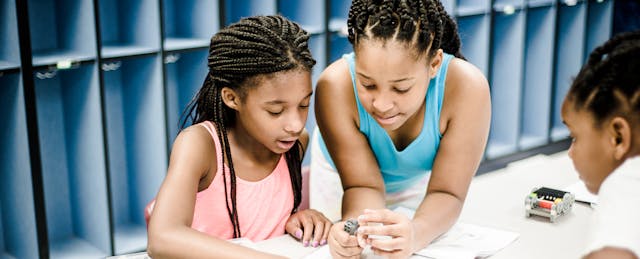Shawnta Spencer sits in a tall chair at the front of the classroom, the projector set up behind her. She’s getting ready to show her students a video from California’s Salinas Valley, where giant robots roll through crops of lettuce and use high-pressure water knives to harvest vegetables. This kind of technology is changing the future of farming, and Spencer wants to make sure her students have a sense of what the robotics field is capable of achieving. In doing so, Spencer offers learners a window into their own futures and potential career paths.
The 25 kids in her classroom at Shelby Traditional Academy in Louisville, Kentucky’s Meriwether neighborhood are temporary students of Spencer’s—third through fifth graders participating in a summer camp focused on literacy. The enrichment program—offered by Jefferson County Public Schools as part of its diversity, equity, and poverty initiative—runs throughout June and July.
Offered in two-week-long sections, the camps use literacy as a cornerstone for learning alongside other interests, including photography, yoga, hip hop and robotics. The camps, which are free for JCPS students, meet at several of the city’s schools that receive Title I funding, serving a high percentage of children from low-income families.
Spencer, who teaches second grade at Shelby Traditional during the academic year, leads a section of “Literacy & Robotics.” Despite only having known this particular cohort for a little over a week, she is acutely aware of her learners’ particular circumstances. She knows who is a non-native English speaker, which students have special learning needs, and which come from homes where they’re facing extreme poverty. Throughout the school year and during summer camp programs, Spencer keeps her classroom stocked with clothing and food, donated by her church, for any learners who need extra resources. It’s important for her to ensure that the basic human needs of each student are met, before the learning begins.
Each day, Spencer structures activities around a different industry—students learn about robots in medicine, in the home, in manufacturing, and in the military. Her biggest priority is to make learning relevant and interesting, and to do that she uses a unique combination of instructional approaches, curricular resources and technology.

As part of the program’s community service component, camp participants spend a portion of the day tending to the school’s garden. When they return to their desks after weeding and watering beds of strawberries, cherry tomatoes, and peppers, Spencer uses the garden to anchor students in a discussion about the role of robotics in agriculture.
“Tell me what you would do right now if you could create a robot for our garden beds outside,” Spencer asks. As soon as the words leave her mouth, almost every student flings an arm into the air. Spencer addresses each learner by name as she works her way around the room, making sure everyone has a turn to speak.
To better facilitate this challenge-based learning activity, Spencer gives students a moment to explain their creations, and by the time they’ve finished she follows up with a question to encourage students to think through a more careful cultivation of their vision, even when it means the lesson runs over by a few minutes. The energy in the room heightens as students dream up everything from a scanner that would determine when fruits and vegetables are ripe and ready to pick, to a robot that identifies bugs and indicates whether they’re harmful or helpful to the garden’s delicate ecosystem.
In the first days of camp, students complete a diagnostic activity to gauge reading comprehension and are placed into one of two groups, where books and exercises are tailored to their specific abilities to maximize progress. Learners read either “ Robots” from National Geographic Kids or “Nick and Tesla’s Robot Army Rampage,” alongside completing comprehension exercises from ReadWorks. On the final day of camp, students participate in another diagnostic task to track the program’s efficacy.
During individualized learning activities, Spencer focuses on skills like identifying textual evidence. She leads exercises that show learners how to support an argument while explaining ways to distinguish a fact from an opinion, as well as discussing writing and grammar mechanics and practicing vocabulary in context. Students self-pace their work, completing assignments in small groups or on their own.
To help make lessons more relevant, Spencer relates content to popular games such as Minecraft, and she reminds students who feel challenged by a particular activity that “failing just means we haven’t figured something out yet.” Each learner’s progress is tracked and shared with parents through portfolios via the communication app ClassDojo.

As students read daily about robotics, Spencer supplements book passages with videos from YouTube and TeacherTube, taking her students on a tour through a digital robotics zoo. Watching robots in action helps students when it comes time for experiential learning. Every afternoon, camp participants spend two hours in a hands-on robotics course taught by the national organization Bricks 4 Kidz, which operates a franchise in Louisville.
Students work alone or in pairs to build mechanisms like cars, catapults, helicopters, and even a chomping alligator with special kits provided by Bricks 4 Kidz. The kits use proprietary LEGO® bricks, and the activities are designed to build skills in engineering, architecture, and physics. Students work at their own speed, with educators like Spencer, a Bricks 4 Kidz instructor, and an instructional assistant hanging back and lending a hand only when asked.
To help break up the day, learners use GoNoodle, an interactive movement and mindfulness platform that tracks daily classroom activity. Involvement earns users points and rewards that unlock new levels and achievements, similar to a video game, and keeps students moving—a critical support tool for maintaining an engaging learning environment.
At this summer camp, students become familiarized with career possibilities they didn’t even realize were available to them. They learn that there’s such a thing as a doctor who focuses exclusively on treating cancer, or how to identify trades in industries like manufacturing. “The interesting thing is that this robotics camp doesn’t just teach them about robotics,” Spencer says. “It opens up life to them.”
Kirsten Clodfelter is a freelance writer and digital content strategist living in the Midwest


